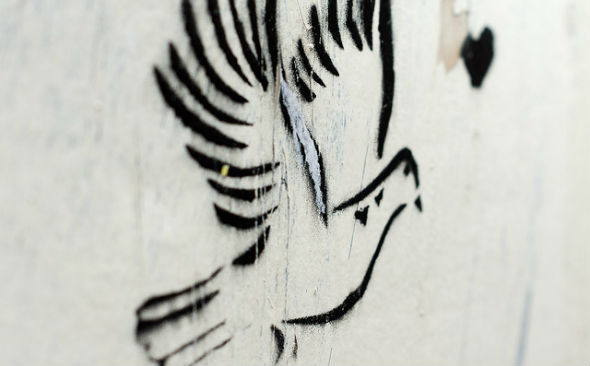Web We Want’s newsletter highlights one important topic every week and tells you what you need to know in 3 minutes or less.
What’s Going On?
In the event of cyber war, it may not help to duck and cover under a desk. So what should you do?
To this day, there arguably isn’t that much cyber warfare going on. The term refers broadly to using computers as a weapon to hurt your enemy. Say, like the malicious Stuxnet computer worm that seeks out computers associated with Iran’s nuclear programme. Or perhaps the Chinese hacking that revealed the private info of millions of people in a U.S. federal database.
Cyber defense systems, surveillance and hacking capabilities are being ramped up by governments, who see both threats and opportunities — especially since Edward Snowden revealed the extent of U.S. surveillance in 2013. Conventional war has international treaties that guide military action, but there is still no clear definition or legal framework for cyber war.
“Cyber peace” is about flipping the perspective and seeing how to protect the Internet from becoming a battleground. It’s about defining a political process that could de-escalate conflict, and even lead to a cyber war convention, like those for biological or chemical weapons.
Who’s Doing Something?
A roadmap to cyber peace is still something that only exists at the research level.
The World Federation of Scientists adopted a Declaration on Principles of Cyber Stability and Cyber Peace which has no legal power, but serves as a moral compass for science. They shared it with United Nations member states in 2009 and continue to distribute research on this and related issues in the realm of the International Telecommunication Union (ITU).
There have been other attempts to define what the principles for cyber peace should be. One example is that of Information Workers for Peace (FIfF) in Germany, who have a concise 14-point list of political demands created by technology professionals.
The principles of cyber peace involve swinging the power balance to citizens, giving governments everywhere less power and technical capacity to intercept information that is meant to be secure, both for critical infrastructure and private persons.
Governments often argue they need as much control as possible to make citizens safe, but mass surveillance does not generate the amount of useful intelligence advertised. And the data collected is vulnerable to hacking and misuse, not least by governments themselves. The fight for anonymity and privacy rights is critical for cyber peace.
What Should I Do?
- Resist militarization of the Internet. Support legislation and policies that protect privacy, anonymity and human rights friendly communication.
- Alarmist media headlines about “cyber war” are often misleading. Don’t succumb to the fear and ignorance that leads to an erosion of your civil liberties.
- Could there be war crimes in cyber war? Consider the idea of a cyber weapons convention, like those for biological or chemical weapons.
- Research ways to bring cyber peace ideas to more citizens, elected officials and international democratic processes. Believe the Internet is for peace.



This is a cyber-peace talk, though it doesn’t appear to be one on the surface. We are focused on the protections of critical infrastructures for ANY country. We are angry that corporations allow this kind of thing to pass as ‘security’ and we want it fixed before large numbers of people suffer the consequences.
https://goo.gl/fMgrWX
[…] Source:https://webwewant.org/news/cyber-war-is-over-if-you-want-it/ […]
would you Solona disponibilize the roadmap peace for helping us to war.
Peut-être vous voudriez me poser la question en français, Christophe? Je ne suis pas sûr que je l’ai compris.
What i do not realize is actually how you’re not actually a lot more smartly-appreciated
than you may be now. You’re so intelligent. You already know therefore considerably in relation to
this topic, produced me in my opinion consider
it from numerous varied angles. Its like men and women are not fascinated until it’s something to accomplish with Lady gaga!
Your personal stuffs great. Always deal with it up!